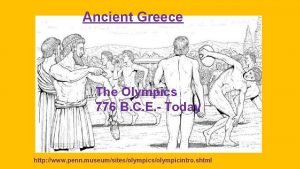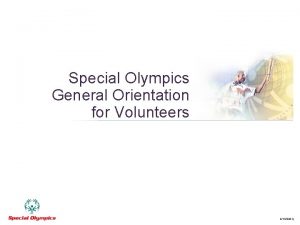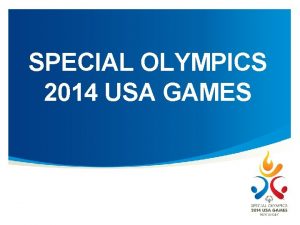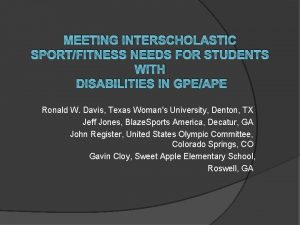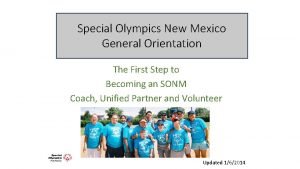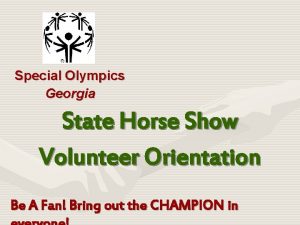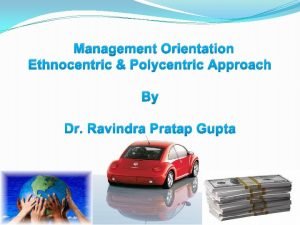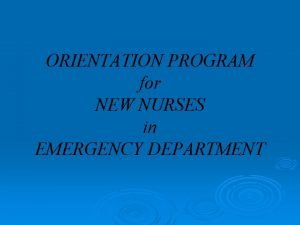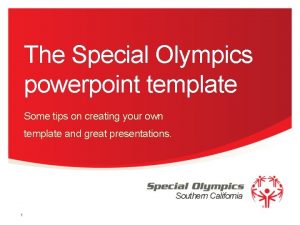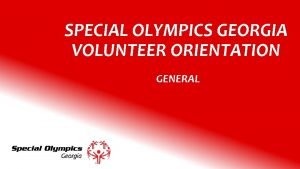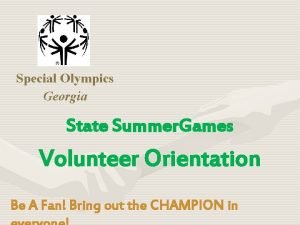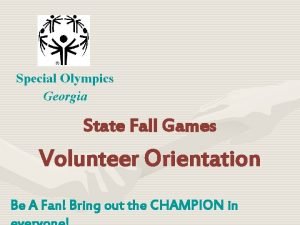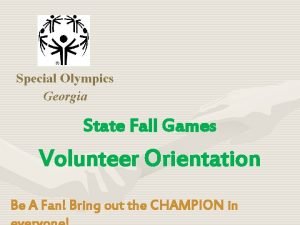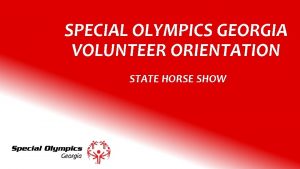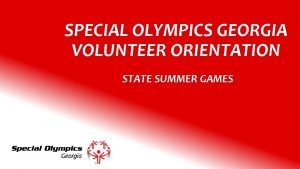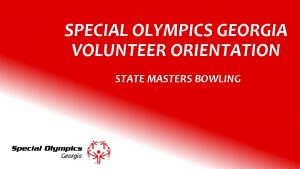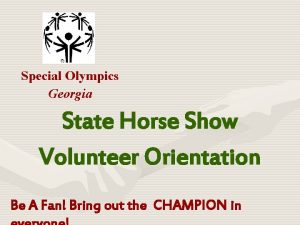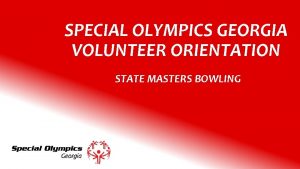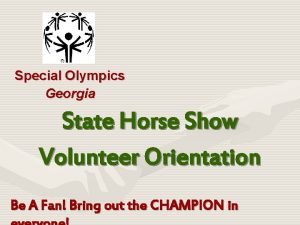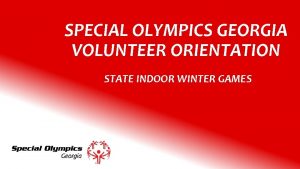SPECIAL OLYMPICS GEORGIA VOLUNTEER ORIENTATION GENERAL MISSION The













- Slides: 13

SPECIAL OLYMPICS GEORGIA VOLUNTEER ORIENTATION GENERAL

MISSION • The mission of Special Olympics Georgia is to provide year-round sports training and athletic competition in a variety of Olympics-type sports for children and adults with intellectual disabilities, giving them continuing opportunities to develop physical fitness, demonstrate courage, experience joy, and participate in the sharing of gifts, skills and friendship with their families, other Special Olympics athletes, and the community.

HISTORY • Special Olympics was founded by Eunice Kennedy Shiver in 1968 • Special Olympics Georgia was chartered in 1970. The first event was held in Atlanta with over 500 athletes. • One of the largest Special Olympics programs in North America • 27, 115 athletes • 25 Olympic-type sports offered year round • 39, 000 volunteers • 5 State Competitions and over 500 local and area competitions offered • Over 200 programs

GENERAL SUPPORT • Special Olympics Georgia is funded through: • Individual Contributors • Corporate Sponsorships • Special Events • In-Kind Donations • We are not a United Way agency and do not get funding from Special Olympics Inc. • Special Olympics Georgia is accredited under Special Olympics Inc. (SOI). SOI manages Special Olympics programs worldwide, including the United States programs and over 170 countries

GENERAL INFORMATION • Athlete Eligibility • Diagnosed with intellectual disability, cognitive delay, or developmental disability • Ages 8 and older • Ages 2 -7 can participate in training through Young Athletes Program • Cleared by a medical professional every three years • 3 Levels of Competition • Local, Area, State competitions held all over the State each year • Types of competition – Individual, Team Sports, Unified Sports • Athletes are divisioned in competitions by age gender ability

SPORTS OFFERED • Alpine Skiing/Snowboarding • Aquatics • Artistic/Rhythmic Gymnastics • Cycling • Powerlifting • Equestrian • Roller Skating • Flag Football • Sailing • Floor Hockey • Soccer • Athletics • Golf • Badminton • Ice Skating • Basketball • Kayaking • Bocce • Long Distance Running/Walking • Bowling • Softball • Table Tennis • Volleyball

STATE GAMES • Indoor Winter Games – January • Basketball, Bowling, Floor Hockey, Artistic Gymnastics, Powerlifting • Summer Games – May • Athletics, Volleyball, Aquatics, Tennis, Table Tennis, Soccer, Flag Football, Rhythmic Gymnastics • Masters Bowling – August • Bowling for athletes ages 22 and older • Fall Games – October • Bocce, Softball, Cycling, Golf • Horse Show – October • Western Riding, English Equitation, Showmanship, Horsemanship, Working Trail, Unified Drill

BENEFITS OF PARTICIPATION • The program transcends just sports competition. Special Olympics athletes are confident and independent. They have jobs, they make speeches, they live on their own, and they inspire others. • Physical: Physical fitness along with increased coordination, cardiovascular fitness and endurance. • Mental: Knowledge of rules and strategy along with increased self-esteem, self-confidence and pride. • Social: Teamwork, interaction with peers and people without intellectual disabilities, opportunity to travel and learn about other places and interests, family pride, and increased community awareness and acceptance.

TYPES OF VOLUNTEERS • • • Coach State Games Volunteer Games Organizing Committee Member Special Event Volunteer Local Coordinator Local Management Team Member Volunteer Coordinator Office Assistant Awards Captain

GENERAL GUIDELINES Volunteers may hug an athlete only when the athlete initiates the hug Volunteers should not disrupt competitions in any way Volunteers should encourage, not coach, the athletes Volunteers should be friendly, not threatening or harassing to other volunteers or staff • All equipment, banners, t-shirts, and other materials used during competition is the property of SOGA or participating agencies. Please do not take any of these items including the blue volunteer bibs, which must be returned to volunteer registration when you have completed your assignment. • A situation may arise that causes a delay in competition. Please be patient and understand that the SOGA staff is doing all they can to resolve any issues so that competition can continue. During any downtime, get to know the athletes. • And above all else, HAVE FUN! • •

WHAT TO EXPECT WHEN WORKING WITH ATHLETES One of the biggest questions that new volunteers have is how to work with our athletes. If you are a new volunteer, here a few things to keep in mind: • Special Olympics offers competitions to children AND adults, so don’t assume that an athlete is a child. Make sure to talk to athletes like adults and with respect. • Many athletes like to hug, shake hands, give high fines, etc. You may reciprocate if the athlete initiates it and you are comfortable with that. • Some athletes are in wheelchairs – do not lean on their chairs. • Some athletes have speech impediments. If you cannot understand an athlete, ask them to repeat themselves or ask a coach or one of the athlete’s teammates to help you to understand. • There are some athletes that salivate excessively, are very stiff, or have other symptoms associated with their disability. Please do not stare. • Remember that respect of the dignity and effort of the athletes is the priority at Special Olympics. Pity is not part of the game.

NEXT STEPS • Pick events to volunteer for • Take Protective Behaviors quiz online: http: //www. specialolympicsga. org/volunteer/protective-behaviors/ • Perform Background Screen: www. verifiedvolunteers. com • Contact Volunteer and Event Managers: • Liz Smith, 229 -712 -9973, liz. smith@specialolympicsgaorg • Paul Mc. Neil, 770 -414 -9390 ext. 1116, paul. mcneil@specialolympicsga. org

THANK YOU!! Thank you so much for reaching out to volunteer with Special Olympics Georgia! We are thankful that you are joining the 36, 000 other volunteers in the state of Georgia. Our athletes cannot show their abilities without your help!
 Ancient olympics vs modern olympics
Ancient olympics vs modern olympics Ancient olympics vs modern olympics venn diagram
Ancient olympics vs modern olympics venn diagram Ancient olympics vs modern olympics venn diagram
Ancient olympics vs modern olympics venn diagram Special olympics vs paralympics
Special olympics vs paralympics 2014 special olympics
2014 special olympics Swd
Swd Special olympics creed
Special olympics creed Special olympics new mexico
Special olympics new mexico Special olympics hq
Special olympics hq Georgia state orientation
Georgia state orientation Regiocentric company example
Regiocentric company example Emergency room nurse orientation
Emergency room nurse orientation Xxxfacebook
Xxxfacebook Olympics slide template
Olympics slide template


